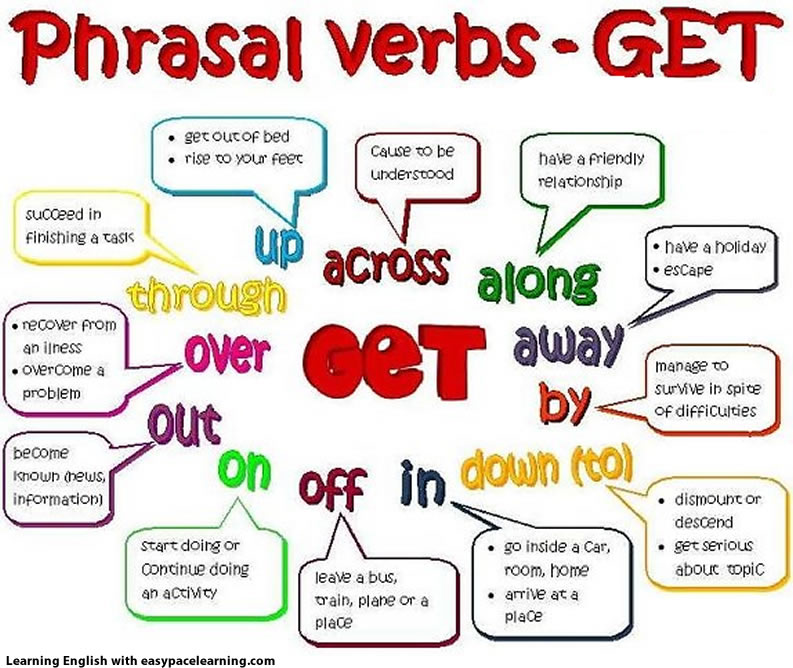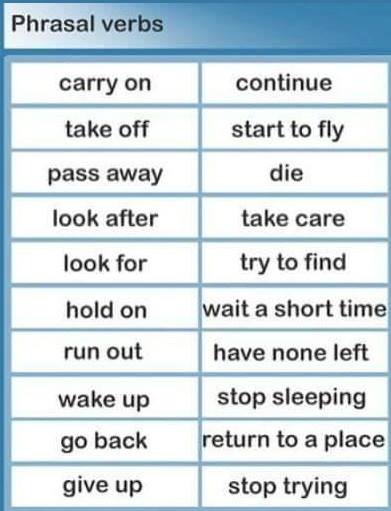Phrasal Verbs Meanings And Examples
- 10 Phrasal Verbs With Meanings And Examples
- Phrasal Verbs And Its Meanings
- Phrasal Verbs With Hindi Meaning And Examples Pdf

A phrasal verb is a type of compound verb made up of a verb (usually one of action or movement) and a prepositional adverb—also known as an adverbial particle. Phrasal verbs are sometimes called two-part verbs (e.g., take off and leave out) or three-part verbs (e.g., look up to and look down on).
- A phrasal verb is made up of a verb and an adverbial or a prepositional particle. It is used idiomatically to convey a special meaning completely different from the meaning expressed by the verb or the particle.
- How can the answer be improved?
There are hundreds of phrasal verbs in English, many of them (such as tear off, run out [of], and pull through) with multiple meanings. Indeed, as linguist Angela Downing points out, phrasal verbs are 'one of the most distinctive features of present-day informal English, both in their abundance and in their productivity' (English Grammar: A University Course, 2014). Phrasal verbs often appear in idioms.
Follow the list for get phrasal verbs – definitions and examples; Take after sb Meaning; If you take after sb, you are similar to or resemble someone (especially a member of your family) in appearance or character or attitude or behavior, etc.

According to Logan Pearsall Smith in Words and Idioms (1925), the term phrasal verb was introduced by Henry Bradley, senior editor of the Oxford English Dictionary.
Examples and Observations
10 Phrasal Verbs With Meanings And Examples
Mignon McLaughlin
'What you can't get out of, get into wholeheartedly.'
William Shakespeare
'Put out the light, and then put out the light.'
Frank Norris
'I never truckled; I never took off the hat to Fashion and held it out for pennies. By God, I told them the truth.'
K.C. Cole
'Clots of excited children egged each other on, egged on their parents, egged on the blue-haired ladies and the teenage lovers and janitor who put down his mop to play.'
Joseph Heller
'Major Major had never played basketball or any other game before, but his great, bobbing height and rapturous enthusiasm helped make up for his innate clumsiness and lack of experience.'
The Semantic Coherence of Phrasal Verbs
Laurel J. Brinton
'Like compounds, phrasal verbs have semantic coherence, evidenced by the fact that they are sometimes replaceable by single Latinate verbs, as in the following:
Furthermore, the meaning of the combination of verb and particle in the phrasal verb may be opaque, that is, not predictable from the meaning of the parts.'
– The Structure of Modern English: A Linguistic Introduction. John Benjamins, 2000)
- break out: erupt, escape
- count out: exclude
- think up: imagine
- take off: depart, remove
- work out: solve
- put off: delay
- egg on: incite
- put out: extinguish
- put off: postpone
Phrasal Verbs With Up
Ben Zimmer
'[P]hrasal verbs with upWatch free all gangster movies. have filled a wide variety of roles in both British and American English. Up gets used for literal upward movement (lift up, stand up) or more figuratively to indicate greater intensity (stir up, fire up) or completion of an act (drink up, burn up). It’s particularly handy for blunt imperatives calling for resolute action: think of wake up!, grow up!, hurry up! and put up or shut up!'
– 'On Language: The Meaning of ‘Man Up.' The New York Times Magazine, September 5, 2010
Phrasal Verbs and Prepositional Verbs
Phrasal Verbs And Its Meanings
'A phrasal verb differs from a sequence of a verb and a preposition (a prepositional verb) in [these] respects. Here call up is a phrasal verb, while call on is only a verb plus a preposition:
(R.L. Trask, Dictionary of English Grammar. Penguin, 2000)
Phrasal Verbs With Hindi Meaning And Examples Pdf
- The particle in a phrasal verb is stressed: They called up the teacher, but not *They called on the teacher.
- The particle of a phrasal verb can be moved to the end: They called the teacher up, but not *They called the teacher on.
- The simple verb of a phrasal verb may not be separated from its particle by an adverb: *They called early up the teacher is no good, but They called early on the teacher is fine.'
Also Known As: compound verb, verb-adverb combination, verb-particle combination, two-part verb, three-part verb



